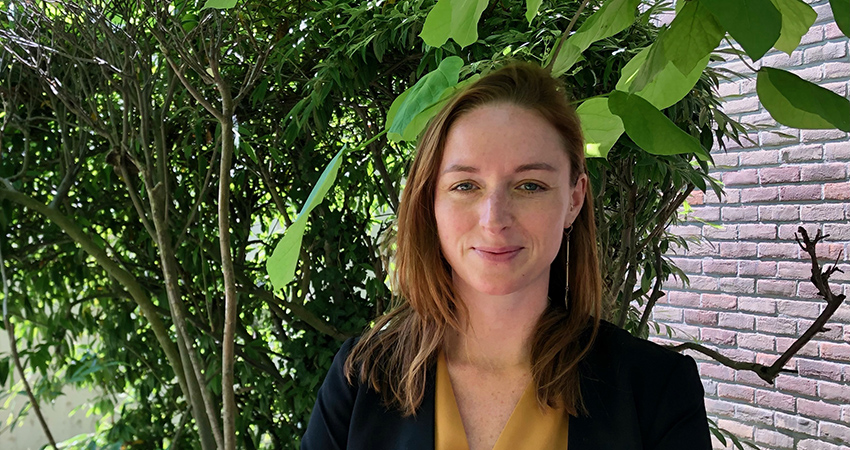Maureen: “I learned to look at a specific topic from different angles”

-
 Editorial Team
Editorial Team
Share article:
Maureen Walschot from the University of Louvain in Belgium is participating in the third group of the European Junior Water Programme (EJWP). She is sharing her experiences on Water News Europe. “Thanks to the work with the EJWP team, I have learned to look at a specific topic from different angles.“
What and where is your current work position?
“I am a teaching assistant in international relations, and a research scientist at the Catholic University of Louvain in Belgium. I’m also the coordinator and tutor of the UCLouvain training program ‘Préparation au concours diplomatique.’ My specific fields of specialization include water diplomacy and cooperation, policy analysis, and environmental security and gender.
My research is in working to better understand the water, peace, and security nexus and how it shapes hydropolitics. Therefore, climate change is an important component in this analysis, as is gender. By producing an adequate analysis of the links between the environment, security and gender, we can acquire the tools to produce a gender-sensitive framework to address this issue and ensure security for men, women and the environment.”
What are the benefits of an international water-sector network? And how are you building a water network with EJWP?
“The water sector is relatively large and very active. In the last six years since I have started to work in this field, I have met and keep on meeting invested and action-driven people. However, I have mostly interacted with professionals in my specialization, which is in transboundary water management. EJWP enables me to broaden this network of water professionals and expend my knowledge over other water disciplines.”
What can better-connected international water professionals mean for water sector organizations?
“It’s about collaborating on trans- and multidisciplinary projects, as I did in my Ph.D. dissertation, combining both the international relations and geography expertise to produce a global analysis of the impact of large-scale seawater desalination on transboundary water management. I could not have achieved my work without the skills and knowledge from both sectors. I believe this multiple and holistic approach can only beneficiate to water sector organizations.“
What value are you bringing to your organization and career from your EJWP journey?
“So far in my EJWP journey, I have acquired both project management skills and team building skills, among others. These were aspects that lacked in my day-to-day job and that I can now bring to the table in the university I work for, as well as in research projects I am currently conducting with other institutions.”
What is your most valuable experience with EJWP so far?
“I would definitely say the training week we just had in Brussels 13 – 17 June. Due to professional constraints, it was the first time I could be with my team for the duration of the week. The exchanges we created and teamwork we achieved really set the whole EJWP experience to another level. The networking we could develop thanks to the program Naomi created for us has also reinforced the connection aspect of the program.”
What have you already learned or developed in knowledge or skills?
“The EWJP 3 group I am part of comprises people with very different backgrounds, and the combination of our knowledge and skills has allowed me to broaden my spectrum of understanding of various water issues. Mainly, through the work with my team, I have learned to look at a specific topic from different angles.“
What is a water or environmental topic that you see as growing in importance or concern in the future?
“There are three topics that are close to my heart and that I believe should be growing in concern in the future: 1) groundwater management, 2) gender mainstreaming in the water sector, but also the 3) plastic contamination of our oceans.”
What is there to do about this?
“It’s all about making the invisible visible. Be it groundwater, women and gender minorities, or marine litter, they remain out of sight, and most of the time out of mind. However, the urgency is here. We need more data in order to act efficiently. And there is much to do. For example, I will be leaving for Central America in a few weeks for a postdoctoral research project on gender mainstreaming in transboundary groundwater management, looking at opportunities and challenges for women to participate in the management of aquifers in the region.”
What did you study?
“I have a bachelor’s degree in political sciences from the Université Saint-Louis Bruxelles and a master’s degree in international relations with a specialization in conflict management and diplomacy from the Université catholique de Louvain. As of February 2022, I hold a joint Ph.D. in political sciences from the Université catholique de Louvain and in geography from the University of Haifa in Israel.”
Where and in which position would you like to be working in five years?
“I am currently applying for a MSCA Fellowship to further my research on gender and water security. It would therefore allow me to keep on developing my career in the research sector. However, I could also see myself work for any international or regional institution or NGOs where I could apply my expertise and skills in water security and gender on the field, such as Afghanistan or Mexico. I have a particular preference for projects in the Middle East or Latin America, two regions I know well.”











